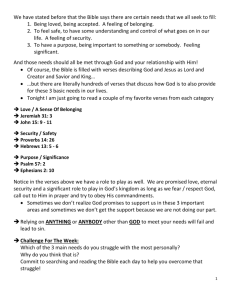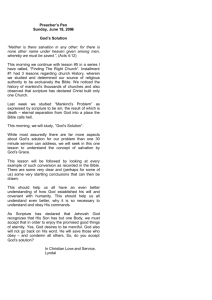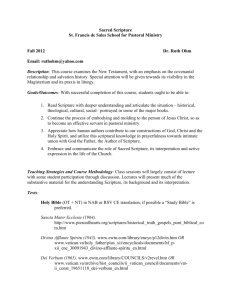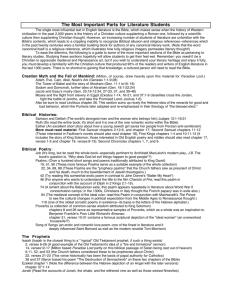Topical Bible Study Instructions
advertisement
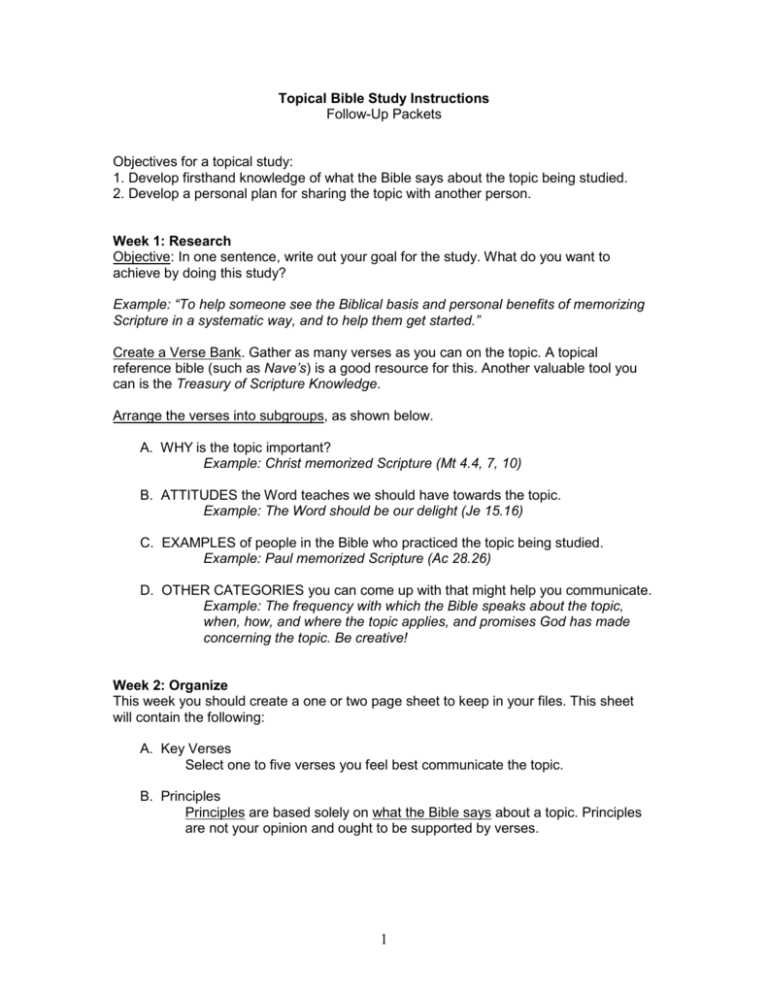
Topical Bible Study Instructions Follow-Up Packets Objectives for a topical study: 1. Develop firsthand knowledge of what the Bible says about the topic being studied. 2. Develop a personal plan for sharing the topic with another person. Week 1: Research Objective: In one sentence, write out your goal for the study. What do you want to achieve by doing this study? Example: “To help someone see the Biblical basis and personal benefits of memorizing Scripture in a systematic way, and to help them get started.” Create a Verse Bank. Gather as many verses as you can on the topic. A topical reference bible (such as Nave’s) is a good resource for this. Another valuable tool you can is the Treasury of Scripture Knowledge. Arrange the verses into subgroups, as shown below. A. WHY is the topic important? Example: Christ memorized Scripture (Mt 4.4, 7, 10) B. ATTITUDES the Word teaches we should have towards the topic. Example: The Word should be our delight (Je 15.16) C. EXAMPLES of people in the Bible who practiced the topic being studied. Example: Paul memorized Scripture (Ac 28.26) D. OTHER CATEGORIES you can come up with that might help you communicate. Example: The frequency with which the Bible speaks about the topic, when, how, and where the topic applies, and promises God has made concerning the topic. Be creative! Week 2: Organize This week you should create a one or two page sheet to keep in your files. This sheet will contain the following: A. Key Verses Select one to five verses you feel best communicate the topic. B. Principles Principles are based solely on what the Bible says about a topic. Principles are not your opinion and ought to be supported by verses. 1 C. Personal Convictions Convictions represent what you think concerning the topic. Others may or may not share your convictions. Example: “I believe I should memorize at least one verse a week.” D. Personal Illustrations Any new or creative way to express your ideas. Diagrams, stories, analogies, examples, pictures, etc. E. Personal Applications Now that you have studied the topic, what is God telling you to do? Make sure you are “log-free” before you start “tackling specks” (Mt 7.5). Week 3: Share (Your follow-up packet should fit on a 3x5 index card.) I. Topic - same as above in week 1. II. Objective - same as above in week 1. III. Motivation - Why is it important to understand and apply the topic? Your reasons should be concise so you can memorize them. You should be able to share these motivations six months from now without prior review. - 3 to 5 main points - 3 to 5 verses (memorized) - A few principles and convictions IV. Demonstration - If your topic involves a spiritual discipline (such as Scripture Memory, Prayer, etc.) that can be observed, take an individual with you as you practice it. A living example is always the most potent teaching tool, and it was Christ’s primary means of instruction! V. Methods and Materials - Make a brief list of any methods and materials you could share with the individual to get them started. VI. Arsenal - Similar to the above except it will be a complete list of any methods and materials you want to share with the individual as time passes. Update this list as you find new tools. VII. Evaluation - Establish a standard and plan by which you will be able to measure the individual’s progress on a given topic. Tips on Evaluation 1. Set a future date when you might revisit the topic with the individual and see how they are coming along. You do not need an official date, just an idea in your mind of when you might follow up with the person. 2. Adjust your goals and training according to the individual’s progress. Remember to be flexible. 3. Remember: Just because they started does not mean they are continuing. 2

